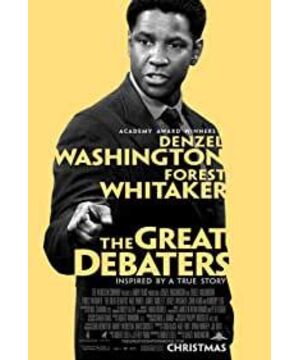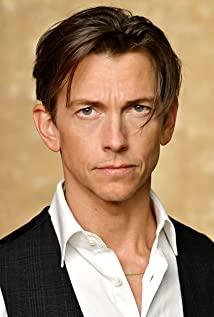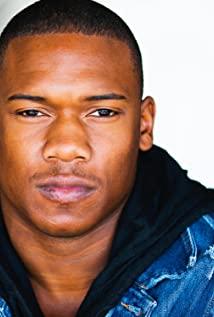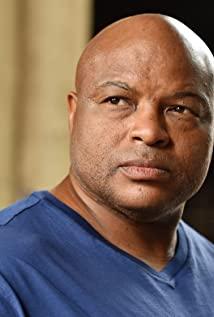In the film, although it is already the United States after Roosevelt's New Deal, black people are still treated unequally, and even those who have changed their fate through reading have gained social status (Professor Farmer in the film is proficient in seven languages, and is also a barrister, Presidents of black universities) are unavoidable, fearful of the rude white people around them, and always give in. Not to mention that in some states black people would be hanged at will. So how do black people seek their own equality and freedom? Fighting by force will only make the black community more exclusionary from the white society. In the era of civilization, adopting civilized means, through debate as a channel to show the strength of college students, let the American people hear the voice of black people and feel the pressure of civilization and morality, thereby changing the fate of black people, this is a kind of better than Gandhi "Non-violence and non-cooperation" is a smarter and more effective means. In the film, three black students from Wiley University, led by a black professor Thorson, took to the debate stage, debated with other black college students, debated with white college students, and finally debated with Harvard students, and defeated what is known as the United States. The champion Harvard debate team (the film is based on real stories and characters, but the real national champion was the University of Southern California before, but to make it easier for the audience to understand, the film was changed to Harvard), and then won the championship for ten consecutive years. Through the debate, the experience of black people (being hanged at will) and the demands of black people (getting equal rights to education, etc.) were widely spread, and they really talked about civilized means, obtained their due rights, and really used knowledge to change their destiny.
Movies not only show the value of debate, but also the art of debate.
The first is the basis of the debate, which is to have a solid logic. What is solid? In the film, Ma Wen used a typical case when teaching students.
Thorson asked students to be the opposite of "welfare measures that don't make people work hard." Thorson's thesis is that welfare measures erode the most important element of people's desire to work, the desire to survive, and depress the poor.
Booker's rebuttal: I'd say that's not the case, most of the new provisions are for young children, as well as people with disabilities, and the elderly (these are based on President Roosevelt's "fireside chats"). It's like seeing a mother unable to raise her own child. Without welfare, Mr. Torsen, people would go hungry.
Originally, Booker's debate was no problem and was well-founded. But that's how Torsen lured her into her own trap.
Torsen: Who's going to starve, Miss Buck?
Buck: People who don't have a job!
Thorson pointed out immediately: is Mr Burgess here too? He also didn't work and apparently wasn't starving. You are trapped, Miss Buck. You give a questionable premise, and then the syllogism you follow falls apart. There is a problem with your logic. Major premise: People without jobs will starve. Minor premise: Mr Burgess does not have a job. Conclusion: Mr Burgess will starve.
This dialogue actually stated that the core of the debate lies in "deduction" and "induction". "Deduction" is an absolute, major premise: people without jobs will starve. Minor premise: Mr Burgess does not have a job. Conclusion: Mr Burgess will starve. Such reasoning is "absolutely correct". Because it is logically impeccable.
And Buke, naturally, thinks that his theory is correct: those who enjoy benefits are those who are not able to work, and those who are able to work are working. Welfare measures can help those who are unable to work, and naturally they will not affect those who are able to work. In fact, this "extensive division" and "general induction" must be problematic. Because in reality, there must be "people who are not able to work but cannot enjoy benefits (treated unequally, or unwilling to accept humiliating help)", and there are also "people who are able to work but have no jobs (the unemployed)", There are also "people who don't have a job, don't need government benefits, and can't go hungry (based on the benefits given by family and friends, gnawing the elderly, etc.)".
Our induction is always incomplete, just as our understanding of the world is always limited by "time", "space", "cognitive ability" and so on. For example, Village A is a wealthy village, because the dozens of people we know are very wealthy, but there may be a poor man hiding in Village A that we don’t know. As long as he is found, we can’t say that everyone in Village A is are rich. This "all" is absolute, and the "no" in Buke's words is also absolute.
In short, whether we debate or think, the process of reasoning mainly relies on logical deductions, such as syllogisms; there are also inductive deductions. However, induction is basically "incomplete induction". Therefore, when expressing, pay attention to the rigor of the wording, and try not to appear absolute expressions, such as "all", "all", "all", "certain", "necessary", and "no" and "no" (note the double negative, negative and negative True. As "all students are good students, then no student is bad" is true.) If Booker's statement "Many people without jobs will starve!" add "A lot of "Such an abbreviation. There was no way for Thorsen to initiate his rebuttal.
The second is the technique of debate. The film shows two main techniques: quoting famous quotes and appealing to emotions.
We know that debate is about making a point and proving a point. Opinions are based on "premises" and "axioms". So what is the best axiom?
In the film, Thorson focuses on developing their basic debating skills—that is, quoting famous quotes.
Thorson's most satisfying student was Henry Rowe, because of his memory and erudition. Tosun can test him like this: Mr. Luo, I will assign a topic, you can say a few words, quoting from a world famous book, let's start. "beauty"?
Henry: I've heard very old people say: All beauty fades away like running water.
Thorson: "History," this time to name the author.
Henry: History is like a nightmare that I'm trying to wake up from. - James Joyce
Thorson: 'self-pity'
Henry: I've never seen a savage thing feel sorry for itself. - DH Lawrence
Why is such a debate method effective? The reason is simple: not only are famous sayings from famous people, but also because "celebrities" are generally successful and experienced people, and more importantly, "famous sayings" have been tested by others. Therefore, the famous saying is a realistic secular "axiomatic existence". Quoting famous sayings as the basis for the argument gives a major premise, and then you say that there is a problem with this, then you go to so-and-so, they are great thinkers, national pride, and national heroes!
What's more, citing famous quotes, you can also cite the other party's admitted point of view. This makes it impossible for the opponent to argue. Like the debate in the film, when the Wiley University debate team was debating with white college students, the white college students quoted famous black scholars to oppose black people entering white colleges (the system was imposed on them only when the South was not ready. would increase racial hatred. Dr. Dubose, probably the most famous black scholar in America, said it was a stupid waste of money, time and patience to force most people to do things they didn't intend to do); Wiley When the university debate team debated with the Harvard debate team, they used the words of Harvard graduate and famous scholar Thoreau to justify "non-violent non-resistance" (Gandhi's influence did not come from the Hindu scriptures, but from Henry David Thoreau. I believe he graduated from Harvard and used to live by a small pond not far from here).
"Appealing to emotion" is not logical in itself, and it has always been something that Professor Thorson despised. However, the film shows the effectiveness of this technique. The first time was when Henry Rowe arbitrarily adopted the content that Boco used and was denied by Tosson before, and used it in the debate. To demonstrate that even after the recession is over, handouts are still going to be given to the poor, described: A brilliant young woman I know who was asked about her arguments for her views on social welfare outlines the most powerful Image: The face of a mother unable to feed her own child. Dare you look into the eyes of a hungry child? Have the heart to see his feet covered in blood as he walked across the cotton field barefoot? Or ask his sister, who suffered from ascites from starvation, if they cared about their father's work ethic?
Debate is about reasoning, and reasoning emphasizes reason and logic. You can’t always say, “If you look at me in such a miserable situation, don’t refute me.” However, in reality, strict expression and logic are It is difficult for ordinary listeners to keep up, and in turn, emotional descriptions can easily enter the human brain. For ordinary people, appealing to emotion is easier to listen to than elaborating logic, and it is easy for the audience to fall into "moral kidnapping", and it is easier to obtain results.
The most intense debate at the end, the final debate between Wiley and Harvard. In fact, both parties are resorting to emotion.
Harvard: We can't decide which laws to follow or ignore, and if we could, I'd stop at the red light. My father was a man who stood between us and the chaos - a policeman. I still remember the day his partner, his best friend was shot on duty, and most vividly I remember the look on my dad's face, any erosion of the law is immoral, no matter how fancy their names are.
Willie: In Texas, people lynch black people, and my teammates and I saw a man hanged around his neck and burned. We drove a lynching mob, we pressed our faces to the floor of the car, and I looked at my teammates, and I saw fear in their eyes. What's sadder is that I saw shame, what crime did that black man commit. Let him be hanged directly in a foggy forest without a trial? Is he a thief? a murderer? Or just because he's black? Is he a tenant farmer? evangelist? Are his children waiting for him? What do we become when we lie motionless? No matter what he did, that mob was the culprit. But the law doesn't do anything, and we can't help but think about the opponent's argument that "any erosion of the law is immoral." But in the segregated South, there were no laws; at least not when blacks were denied residency. When we were rejected by schools, hospitals, when we were lynched, there was no law. St. Augustine said, "An unjust law is no law." This means that I have the right, and even the responsibility, to resist with violence or passive resistance, and you should be glad I chose the latter.
In addition to the above two, there are other means of debate, such as the "data" that appears many times in the film, but it is obvious that although it is convincing, it is obviously not as effective as the above two.
Finally, let's come back to understanding the real issues in the debate. In fact, most of the content of the debate has already been judged on moral and legal principles from the beginning. For example, the three debates in the three debates in the film, according to my point of view, although they cannot be said to be "right and wrong", they have distinct tendencies theoretically and morally.
The first debate topic "When the economic depression ends, the distribution of unemployment benefits should also be stopped." There is a time limit. Although there will still be people who need relief after the "economic depression is over", but at this time, the importance of unemployment benefits It's not big anymore. Wiley University, as the anti-party, put forward the point of view at the beginning, in fact, to support the positive point of view, and it was not until the final "appeal to emotion" that the key victory was achieved. In terms of the basis of the debate, it is better to grasp the logical connection from the beginning: the relief funds come from taxes, and the taxes increase the pressure on enterprises, and the great pressure on enterprises is not conducive to the creation of employment, and will only cause more unemployment. into a vicious circle.
The second debate, "Black people should be allowed to enter state universities," is clearly established from the point of view that "equality" is the moral and civilized standard of human beings. This can be seen from the fact that the negative side can only refute from "the time is not ripe, it should not be allowed at present" as an entry point, while the positive side wins in the end by simply emphasizing "know when it is finally allowed, so when will it be allowed".
The third debate "Passive resistance is a moral weapon for maintaining justice". First of all, no matter what the previous "passive resistance" is changed to, in the following description, "upholding justice" is naturally a "moral weapon", and "justice = morality" This holds true across a wide range of semantics. Therefore, what the Harvard debate team can do is to emphasize that "passive resistance" is "resistance", "anarchism", and "illegal behavior." It is very difficult to force the concept of the audience in this way. And Willie, as a positive, asked everyone to choose the "definition" of "morality of killing" or "morality of non-violence" from the beginning, and there was basically no suspense.
Then, we design the thesis now, and certainly not like the debate in the film, it seems to be in line with the issues of the times, but it is indisputable. However, we can also see from the specific debate that both sides are actually trying to "distort" the argument, using the conditions (time and extent) of the argument as an entry point to find a solid foundation for their own debate.
This misinterpretation is, on the one hand, semantic. It's as simple as in the film, when the Willie debate team members were discussing whether to use Gandhi's "non-violent non-cooperation", the waiter (like the doorman of Peking University) pointed out a problem: non-violent non-cooperation, from Sanskrit word meaning truth and fairness. Think about it, when we translate it, what we understand is this meaning, but the original meaning is not that. Another example is Thoreau's famous quote quoted in the debate in the film: Any man more right than his neighbors constitutes a majority of one already. I was not satisfied with the translation of the film, so I looked it up. There are two translations:
1. Anyone who is more just than those around him constitutes a majority. (meaning "justice dictates that we have more support")
2. Anyone who is more reasonable than his neighbor represents the opinion of the majority. (meaning "we always think we represent the opinion of the majority")
Two translation methods, supporting different viewpoints. According to the Harvard debate team, Hitler supported this view, apparently the second translation. The Wiley debate team's understanding is the first.
On the other hand, it is a range of degrees. The so-called "Tao, Dao, very Tao", there is no truth in the world. Because to put forward a point of view, conditions such as "time" and "space" must be involved, and then the next statement can be made. It is now, and it is not then. Time has changed, and the world has changed, and it is necessary to advance with the times. So, as mentioned earlier, "black people should be allowed to enter state universities" is ethical, so the debate can only be "when will be allowed". The Wiley debate team pointed out that "In the early days of capitalism, the concept of responsibility was: no workers, no food. It did make sense when there were more jobs and people were willing to work; but those days are over. Now, there are millions of people who want to work, but they find themselves waiting in line for relief.” In fact, this is stealing the “premise”, and the “stealing” is obvious, and the “exchange” is clumsy. Acknowledging that "there are more job opportunities, people are willing to work, and it makes sense" has accepted the other side's point of view. And "millions of people want jobs right now" clearly doesn't fit the "recession past" time frame.
So, from my point of view, the film is very good, not only showing the great power of changing the fate of the debate, changing the world; it also shows a lot of the technical issues of the debate. But as far as the Wiley debate team's victory is concerned, I think they won because they were on the side of "justice" from the beginning, and the debate just happened to "nail them on the side of justice"! It's justice that wins, not Willy's greatness.
View more about The Great Debaters reviews











